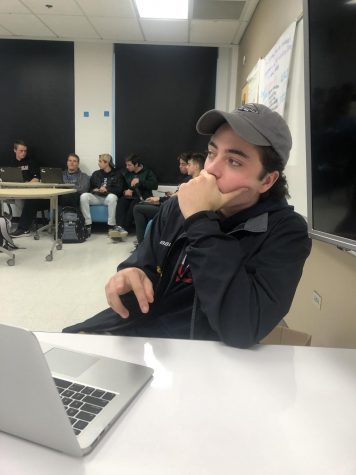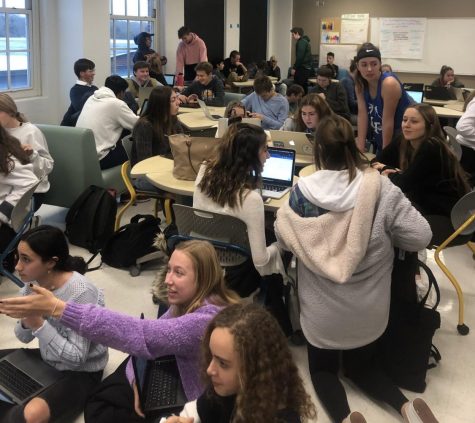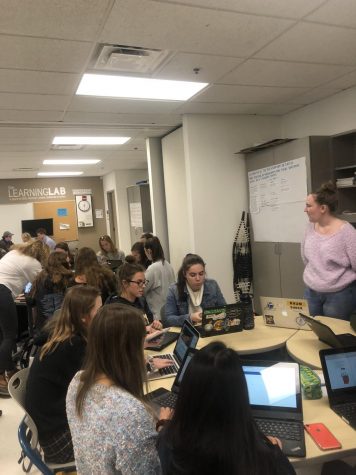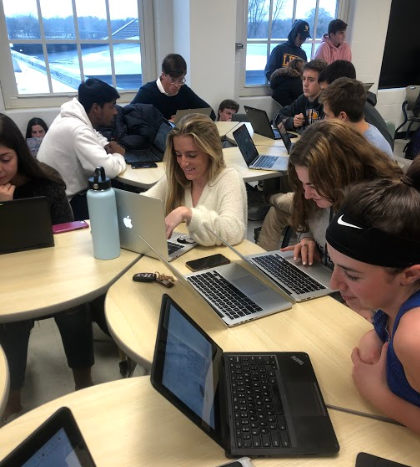Recollections of the Memory Competition Experience
December 18, 2019

In the past couple weeks, Psychology teacher Mr. Brian Boruszak has been offering his kids a fun and interesting alternative to traditional extra credit.
For the better part of a month in Psychology, a class dedicated to unraveling the intricacies behind the human mind. Mr. Boruszak and his students have been discussing the “Memory Palace” a comprehensive strategy for improving one’s memory introduced to the world via Cicero’s De Oratore in the time of the ancient Greeks.
As described to me by Boruszak, the Memory Palace (or Method of the Loci as it is referred in the intellectual community) involves an individual tracing a path through a familiar place, visualizing the objects they wish to remember at various different points along their journey. This process allows the individual to retrace their steps and easily recall the information kept stowed away in the “Palace”.
Boruszak invested a lot of time in Psychology class into making sure his students were familiar with this technique. However, just reviewing this knowledge was not enough. He began to offer the Memory Competition to students after school as an opportunity to hthe skills rehearsed in class and earn extra credit at the same time.

“In Psychology we have been talking a lot about memory, and I had been aware of the global and US memory competitions.” said Mr. Boruszak, “I thought this format would be a good way to apply the principles we had been discussing in class to a real world situation. In Psychology we are always looking for the real world applications.”
The World Memory Championship is a series of memory competitions designed to test a competitor’s ability to memorize a certain amount of information in a finite amount of time with a new champion crowned every year. Mr. Boruszak’s competition involved memorizing a list of 100 words, and conversely a list of 100 numbers. Both in under five minutes.
To many memorizing a hundred words in ANY amount of time seems impossible. But, Mr. Boruszak assured that with the power of the memory palace and a bit of practice this assumption is incorrect.
“There are a lot of people who will simply say ‘I just don’t have a good memory’ and the problem with this is that they are forever resigned to this assumption.”
Boruszak relayed the story of Joshua Foer, a man who one day set out on a mission to become the top mnemonist (a professional memorizer) in the world. He would achieve this feat years later through the use of the memory palace technique before selling Penguin Publishing the rights to his novel Moonwalking with Einstein, the story of his journey to memory masterclass, for a cool $1.2 million (there really are real world applications for memory talents).
Besides the heartwarming story of a man who found success by devoting himself solely to the Memory Challenge, there is a more inspirational message between the lines that Boruszak sought to communicate: with the proper technique, training, and preparation, one can accomplish anything; even memorizing 100 words in under 5 minutes.

As a person who struggles immensely with the problem of memorizing mundane subject matter in a short period of time, and with the intrigue of Mr. Boruszak’s promise of memory improvement through the use of the “Memory Palace” churning in my head, I set my sights on defeating the infamous memory challenge.
I arrived slightly early so as to take in the full scope of the illustrious competition, but I wasn’t prepared for the chaos about to unfold in front of me.
While I had expected a small but devoted few students to attend in the hopes of memory glory, I was taken aback by the ensuing field of competition. Suddenly, about five minutes after the clock struck 3:20, students began to pile up in the room, spilling out into the hall, struggling tooth and nail to scan their school IDs at the table at the front of the room. Before my eyes a wave of students surged through the room, quickly engulfing any seatable location, and every flat surface in the whole space.
A dull roar panged off the walls as apprehension ascended on the room like a blanket, before gradually dying down as soon as Mr. Boruszak made his presence felt in the room. As quickly as the commotion had begun it had ceased to exist and the event was underway.

Within seconds I peeked my head up to see individuals already at the front of the classroom reporting their scores to Mr. Boruszak, and after the passing of a few minutes an increasing amount of students began to assemble at the front of the room.
But while an increasing amount of my indifferent classmates squeezed themselves into a long line slithering in and out of tables, I noticed, scattered around the room, a dedicated few. Stoic and straight faced, they did their best to maintain unwavering focus on their computer screens, even as a horde of agitated students swirled around them.
At the conclusion of the ten minute mark, the group of zealous students stood up and gave their scores to Mr. Boruszak before calmly exiting the room. The event was over and so was my observation, so I thanked him, gathered my belongings, exited school, and drove home where I am now, sitting at my dining room table finishing this story.
And if you read this far down the margin of a column about a simple extra credit opportunity, I sincerely thank you. Because it is hard to articulate when we see people in our lives going the extra mile to help reinforce a positive message and attitude. Those are the types of things that I really appreciate.







